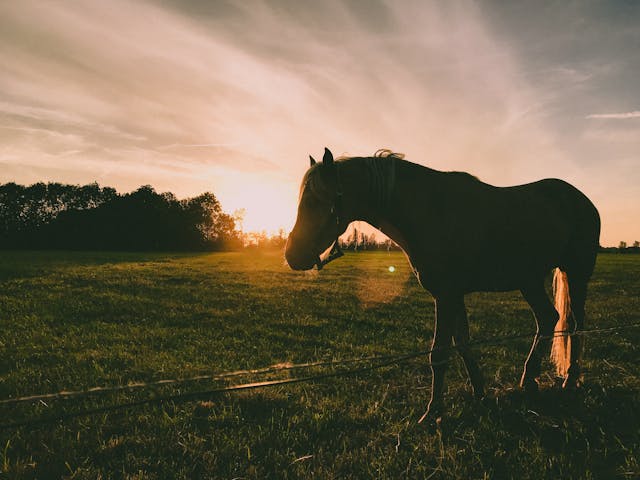An Equi-Box Guide to Owning a Horse for the First Time

Owning a horse for the first time is exciting, but also comes with a lot of responsibility. Horses require daily care, attention, and a well-planned routine to keep them happy and healthy. If you’re new to horse ownership, it can feel a little overwhelming at first—but don’t worry! This guide will cover all the essential horse care tips, from feeding horses correctly to stable maintenance and general well-being.
Understanding your horse’s needs
Before diving into the basics, it’s important to understand what your horse needs to thrive. In order to ensure you are providing excellent care for your new horse, they’ll require:
- A balanced diet with the right nutrients
- Daily exercise and mental stimulation
- A clean and safe living environment
- Regular grooming and hoof care
- Vet and farrier check-ups for overall health
Feeding horses: getting the diet right
A horse’s diet is the foundation of its health and performance. Getting their nutrition right ensures they have enough energy, maintain a healthy weight, and avoid digestive issues.
1. Provide High-Quality Forage
The bulk of a horse’s diet should consist of forage—this includes grass, hay, or haylage. Horses are natural grazers and need constant access to forage to keep their digestive system working properly.
2. Balance with hard feed (if needed)
Some horses, particularly those in heavy work or with specific dietary needs, may require additional hard feed such as fibre-based feeds, balancers, or conditioning mixes. Always tailor their diet based on their workload and health condition.
3. Provide fresh water
Horses need access to fresh, clean water at all times. Dehydration can lead to serious health issues, so regularly check and clean water buckets or troughs.
4. Monitor their weight and condition
Use a weight tape or body condition scoring system to ensure your horse stays at a healthy weight. If you notice sudden weight loss or gain, adjust their feeding plan accordingly.
5. Be careful with treats
While it’s tempting to give your horse lots of treats, moderation is key. Safe treats include carrots, apples, and horse-friendly snacks—but avoid sugary or processed foods.
Daily, weekly & monthly essentials
Taking care of a horse requires consistency. Here are some essential horse care tips to keep your horse in top condition:
Daily
- Check on your horse – make sure they are bright, alert, and moving comfortably.
- Feed and water – provide fresh forage, hard feed (if required), and clean water.
- Turnout and exercise – horses need exercise and regular turnout and movement to stay physically and mentally healthy.
- Grooming – adaily brush helps maintain coat health and gives you a chance to check for injuries.
- Hoof care – Pick out their hooves to remove dirt, stones, and debris to prevent infections.
Weekly
- Check tack and equipment – ensure saddles, bridles, and rugs fit correctly and are in good condition.
- Deep clean water buckets and feeders to prevent bacteria build-up.
- Assess your horse’s weight and condition –make adjustments to feeding and exercise if needed.
Monthly
- Schedule a farrier visit – hooves should be trimmed or shod every 4-6 weeks.
- Check for worms and parasites – follow a worming programme or conduct faecal egg counts.
- Review their diet – adjust feed based on workload, season, or any changes in body condition.
Stable Maintenance: Keeping Their Environment Safe & Comfortable
A well-maintained stable ensures your horse stays comfortable and reduces the risk of illness or injury.
1. Keep the Bedding Clean
Muck out daily to remove soiled bedding and droppings. Fully replace bedding regularly to prevent ammonia build-up and maintain hygiene.
2. Ensure Good Ventilation
Stables should be well-ventilated to reduce dust and dampness, preventing respiratory issues.
3. Maintain Fencing & Stable Structures
Regularly check for broken fencing, loose nails, or sharp edges that could cause injury.
4. Store Feed & Hay Properly
Keep feed in sealed bins to prevent pests. Store hay in a dry, well-ventilated area to avoid mould growth.
5. Keep Water Sources Clean
Troughs and buckets should be cleaned weekly to prevent algae and bacteria build-up.
Recognising Signs of Illness
Learning to spot early signs of illness can prevent minor issues from becoming serious problems. Watch out for:
- Lethargy or unusual behaviour
- Loss of appetite or drinking less water
- Lameness or stiffness
- Changes in droppings or urine
If you’re ever unsure about your horse’s health, always consult your vet for advice.
Building a Bond with Your Horse
Taking care of a horse isn’t just about physical health—it’s also about forming a strong bond. Spending time grooming, training, and simply being with your horse helps to develop trust and a deeper connection.
- Grooming sessions can be a great bonding experience.
- Groundwork training strengthens communication and respect.
- Positive reinforcement builds confidence and trust.
Taking the time to learn and understand your horse’s needs will not only ensure their well-being but also strengthen the bond between you. Whether you’re riding, caring for, or simply spending time with your horse, the rewards of horse ownership are truly priceless.
Looking for high-quality horse feed and care essentials? Explore the Equi-Box online shop for range of products designed to support your horse’s health and happiness.
Posted on: 04/02/2025





